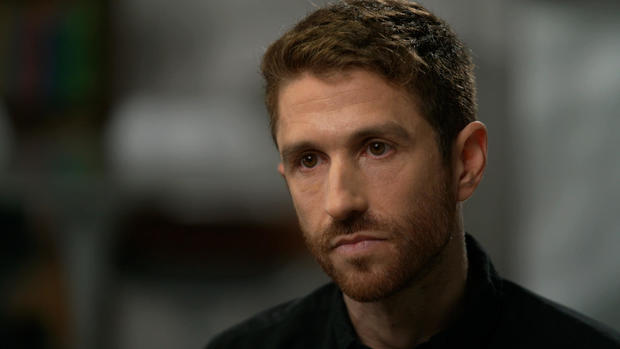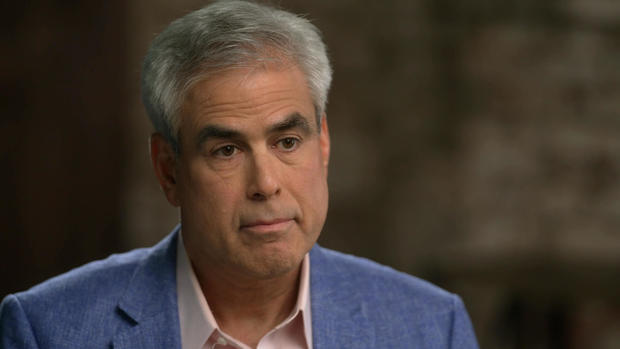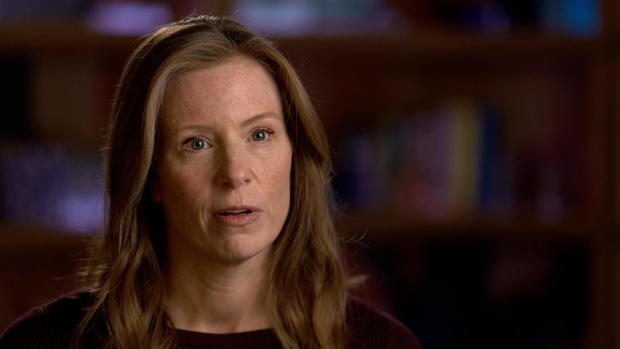Social media’s role in America’s polarized political climate
With midterm elections in just two days, America is in a very angry moment. Republicans attack Democrats, and Democrats return fire. Social media is a showcase of our anger; an analysis by the New York Times this fall found that online use of the phrase “civil war” has exploded.
Now, leading voices in academia and tech are saying that rather than simply reflecting the polarization in society, platforms like Facebook and Twitter are helping to create it.
60 Minutes first met Tristan Harris in 2017. The co-founder of the Center for Humane Technology argued that social media platforms were addicting us to maximize profit. Now, he’s warning they’re generating billions by making us angry.
Tristan Harris: The more moral outrageous language you use, the more inflammatory language, contemptuous language, the more indignation you use, the more it will get shared. So we are being rewarded for being division entrepreneurs. The better you are at innovating a new way to be divisive, we will pay you in more likes, followers and retweets.
In his 2020 documentary, “The Social Dilemma,” Tristan Harris made the case that social media platforms have hijacked our attention. Now, he cites a new study of Twitter showing that attacking political opponents is almost guaranteed to draw attention.
Tristan Harris: Each individual term referring to your political out-group increased the odds of that post being retweeted or reshared by 67%.
Bill Whitaker: Your out-group being your opponents, people on the other side–
Tristan Harris: Out-group being– the other side. Yeah, exactly.
Bill Whitaker: These platforms, are they not just reflecting who we are and what we think and the divisions that are already there?
Tristan Harris: They’re super-charging 100 or 1,000 times to one the worst parts of ourselves.
Here’s an example from the day the Department of Justice released a photo showing classified documents in former President Donald Trump’s Florida home: a tweet highlighting a straight news story on the subject received about 2,000 “likes.” But a tweet from a Republican congresswoman calling Trump’s opponents “dumbasses” was “liked” 10 times as much, and a tweet from the left labeling Donald Trump “a traitor” was “liked” 20 times more.
Bill Whitaker: The straight news story, you know, got retweeted a couple of times. The angry stories, exponentially more tweets–
Tristan Harris: Exactly, exactly.
And, Harris says, anger skews the political landscape.
Tristan Harris: Why is it that the world knows more about Marjorie Taylor Greene than they know about all the other hundreds of congressional candidates? It’s because the enraging inflammatory stuff goes the most viral.
Jonathan Haidt: We are tribal creatures who love to do us versus them. And we’re now learning to coexist with a technology that tries to force that down our throat, that tries to make us angry all the time.
Jonathan Haidt is a social psychologist and professor at NYU’s Stern School of Business. In studying social media platforms’ drive to keep us glued to our devices – and to their ads – he traces our current troubles to the invention of the “like,” “share,” and “retweet” features a decade ago.
Jonathan Haidt: These changes in the technology that made everything much more viral and explosive, it’s as though it gave everybody a dart gun. It’s, like, it gave everybody the ability to complain, attack, criticize anyone at any time in a very short space with no need for evidence, no accountability.
Haidt says the people most likely to fire their social media dart guns are those on the far right and the far left.
Bill Whitaker: What percentage of the population are they?
Jonathan Haidt: It’s about 7% or 8% on each side.
Bill Whitaker: That’s it?
Jonathan Haidt: Yeah. That’s right.
Bill Whitaker: So the extremes have been handed the power to dominate even though they are fewer in number?
Jonathan Haidt: That’s right. Exactly.
The moderate majority, Haidt says, is either exhausted or intimidated.
Jonathan Haidt: It’s what I called structural stupidity. That is you have very smart people, highly educated, highly intelligent, but you put them in a situation in which dissent is punished severely. And what happens? They go silent. And when– when the moderates, or when anyone is afraid to question the dominant view, the organization, the institution, gets stupid.
Take the case of Ronald Sullivan, a professor at Harvard Law School who was also the faculty dean of Winthrop House, an undergraduate residence hall. In January 2019, Sullivan joined Harvey Weinstein’s sexual assault defense team, under the principle that every accused criminal is entitled to a robust defense.
Jonathan Haidt: So at Harvard, some students objected. Now, great, let them object to Ron Sullivan defending Harvey Weinstein. That’s what you should do in s– in school. You should make an argument. And then he can answer back. That would be great. But that’s not what happened.
What happened was that a Harvard undergrad demanded in a Facebook post that Sullivan step down as dean, calling his defense of Weinstein “deeply trauma-inducing” for sexual assault victims.
Jonathan Haidt: The students use a discourse, a dialogue, of “He is dangerous. His presence near me is threatening to me.”
Within a few months, Harvard responded by removing Sullivan as dean of the residence hall. It’s not just professors on the firing line, in a recent survey, more than half of college students said they’re afraid to express views on political and social issues in the classroom.
Bill Whitaker: As a professor, what do you do?
Jonathan Haidt: I just avoid controversial topics.
Bill Whitaker: Really?
Jonathan Haidt: Yes.
Bill Whitaker: Isn’t that what college is for?
Jonathan Haidt: It used to be.
Tristan Harris says the intimidation and anger cut across political lines.
Tristan Harris: I think the deepest, like, perverse thing about these platforms is that they have captured the meaning of social participation in society. That they’ve colonized and privatized that social participation means I’m on TikTok, I’m on Instagram, I’m on Facebook.
And competition is fierce among those platforms for our attention and for the advertising dollars that attention generates.
Tristan Harris: Facebook isn’t saying, “Let me make design decisions that are going to strengthen democracy.” They’re saying, “How do I evolve the product in a direction that will get more engagement from people?” ‘Cause if I don’t do that I’m just going to lose to the companies that do.
Bill Whitaker: Companies like TikTok.
Tristan Harris: Companies like TikTok. And TikTok has become, like, one of the most popular apps around the entire world.
TikTok has done that by serving up an addictive mix of short videos. Some are silly, others overtly political. It’s owned by a Chinese company called ByteDance, and Harris says the version that’s served to Chinese consumers, called Douyin, is very different from the one available in the west.
Tristan Harris: In their version of TikTok, if you’re under 14 years old, they show you science experiments you can do at home, museum exhibits, patriotism videos and educational videos. And they also limit it to only 40 minutes per day. Now they don’t ship that version of TikTok to the rest of the world. So it’s almost like they recognize that technology’s influencing kids’ development, and they make their domestic version a spinach version of TikTok, while they ship the opium version to the rest of the world.
The version served to the west has kids hooked for hours at a time. The impact, Harris says, is predictable.
Tristan Harris: There’s a survey of preteens in the U.S. and China asking, “What is the most aspirational career that you want to have?” And the U.S. the number one was “Influencer.”
Bill Whitaker: Social media influencer.
Tristan Harris: And in China, the number one was “Astronaut.” Again, you allow those two societies to play out for a few generations, I can tell you what your world is going to look like.
TikTok tells us it gives American users tools to limit screen time. But those tools are entirely voluntary. And national security concerns have triggered new calls this past week for TikTok to be banned in the U.S.
Twitter points out that it asks users to think twice before sharing potentially harmful posts. But within days of buying Twitter, Elon Musk tweeted a conspiracy theory about the attack on speaker Nancy Pelosi’s husband. It was later deleted.
And Facebook says it has cut the overall amount of political content that its 240 million American users see. Monika Bickert is its head of content policy.
Monika Bickert: Most people on Facebook don’t want to see political content. They are following what’s happening in the lives of their family and friends and sharing the moments from their lives.
And, Bickert says, Facebook does take steps to downplay the angriest posts.
Monika Bickert: Can you find angry political content online? You can. Can you walk into– the average family’s Thanksgiving dinner and hear people having an angry political conversation? You can.
Tristan Harris says that all the social media platforms are making those conversations even more heated.
Tristan Harris: What I think there’s been a failure to recognize is the direct conflict between an engagement-for-profit business model and what’s good for democracy. Another way you could say it is that the business model is to ruin Thanksgiving dinner.
Bill Whitaker: We are as divided as I can remember in my lifetime.
Tristan Harris: Yeah. A lotta people will say, “Well, hold on a second. Partisanship and division, we’ve had that in many times throughout history.”
Bill Whitaker: Always.
Tristan Harris: Always. That’s true. Also, has partisanship in television and radio pre-existed social media? Yes. Have we ever wired up the most powerful artificial intelligence in the world, pointed it at your brainstem to show you the most enraging content on a daily basis, and the longer you scroll the more you get? We have never done that before.
Facebook’s Monika Bickert insists it’s just wrong to blame it for America’s anger.
Monika Bickert: Also, if we look at who’s becoming more polarized in the United States, the greatest increase is among people over the age of 65. And they are the least likely to be using social media.
Tristan Harris: Many people watching us will say, “Well, I don’t use social media. Why should I care about this?” But we’re all downstream from social media affecting television, affecting radio, affecting journalism. More and more of journalism is about covering the outrage exchange of what happened on Twitter.
Harris believes the best path to reform would be stricter government regulation of social media platforms or at least a requirement that they be more transparent.
Bill Whitaker: Now Facebook will tell you that they’re all about transparency now, that’s not convincing?
Tristan Harris: They publish reports that they define what the metrics are. And it’s like grading your own homework.
Harris has launched an online course which aims to give people working in tech the tools to push for reform from within. And what can an individual user do? Jonathan Haidt says, simply refuse to be gladiators in the coliseum of social media.
Jonathan Haidt: You can’t win a war on social media. Just don’t engage. Don’t engage in the public battles because that’s just feeding the beast.
Bill Whitaker: You don’t mean disengage from the political process. You– you mean just disengage from these platforms?
Jonathan Haidt: Yes. When public discourse was moved into the middle of the Roman Coliseum, I’m saying disengage from that. Walk out of the Coliseum and still be politically active.
Tristan Harris says real change may have to be forced, in court.
Tristan Harris: I think we have to do with social media what happened with big tobacco.
Bill Whitaker: What stopped big tobacco was that the attorneys general in different states–
Tristan Harris: That’s right.
Bill Whitaker: –actually went after them
Tristan Harris: The attorneys general in big tobacco had an enormous role to play in litigating that there was harms to people and their families.
Bill Whitaker: Is that what it’s going to take with–
Tristan Harris: I think that’s what it’s going to take with social media–
Bill Whitaker: –social media companies?
Tristan Harris: Yes. And we’re seeing attorneys general move already one step in that direction.
Attorneys general in at least eight states are coordinating a nationwide investigation of social media platforms.
Tristan Harris: We now know that there’s all these harms in social media products designed for engagement. We’ve done it before. We did it with seatbelts. We’ve done it with big tobacco. We’ve taken lead out of gasoline. We have made these changes once we recognized that certain products were toxic for us. We can do it again.
Produced by Rome Hartman. Associate producer, Sara Kuzmarov. Broadcast associates, Elizabeth Germino and Natalie Breitkopf. Edited by Craig Crawford.
For all the latest Automobiles News Click Here
For the latest news and updates, follow us on Google News.




